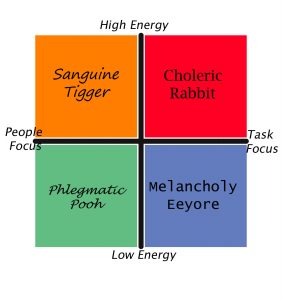This personality is perfectly represented by Pooh Bear. Pooh is the heart of the Hundred Acre Woods, and for good reason. He loves everyone and they love him. He accepts others for who they are, rarely complains and just radiates good humor and gentle kindness. No matter what is going on: games or work, disaster or party, Pooh is ready to join in and help out. Pooh children have sensitive hearts. They instinctively know when someone else is hurting. These are the children who notice a homeless person sitting on the sidewalk and will offer to let them sleep in their bedroom.
 Pooh sits on the bottom left corner of our Temperament Chart . He is low on the energy scale and much prefers associating with people over doing tasks. Pooh makes a great mediator. He is naturally good at letting others have their say and using his keen intuition to grasp what’s not being said. He rarely gets ruffled when someone confronts him. He shares his people skills with Tigger, without the scatter-gun approach. Pooh will zero in on one person and give them his full, undivided attention. He likes serenity, just like Eeyore, but wants people around. Being alone is stressful for him.
Pooh sits on the bottom left corner of our Temperament Chart . He is low on the energy scale and much prefers associating with people over doing tasks. Pooh makes a great mediator. He is naturally good at letting others have their say and using his keen intuition to grasp what’s not being said. He rarely gets ruffled when someone confronts him. He shares his people skills with Tigger, without the scatter-gun approach. Pooh will zero in on one person and give them his full, undivided attention. He likes serenity, just like Eeyore, but wants people around. Being alone is stressful for him.
The more common word for this temperament type is Phlegmatic, defined as unemotional. While Pooh is emotional, it is very low key, usually expressed quietly. The feelings are there, just not expressed. It takes a little gentle prodding on mom and dad’s part to get him to open up. Since Pooh takes a bit longer than most to process his thoughts, don’t be surprised if right after an event you thought was upsetting, Pooh shrugs and says “I’m fine”. It is only later, sometimes days later, after he’s had time to quietly process the event, he may say something. He is not subject to quick emotional highs and lows like Tigger, or the longer burning, deep depression of Eeyore. He takes life as it comes, shrugs his shoulders at problems, then finds a place to go and relax. In her defining book on personalities, Personality Plus, Florence Littauer says the Pooh Bear slogan is “Why stand when I can sit? Why sit when I can lie down?”
This is probably a good place to remind you this description is of a 100% Pooh type temperament. Most children will be a blend of two temperaments with a little of a third thrown in. You will most likely find characteristics that fit your child in at least 2 of the descriptions. Add in environmental influences, being overtired, or plain old emotional fluctuations and some days it may seem a child goes from one extreme to another, never fitting neatly into any description. This is particularly true for children under about 6 years of age. Before that age, much of their character is still forming and it is very difficult to pinpoint their temperament. It is still useful to understand the different temperament types. When a child is acting shy for example, you will know it is likely Pooh’s desire to step back, to watch and learn what’s going on, before committing to participate. Guide and direct those traits into their positive uses instead of trying to stamp them out as “character flaws”
Strengths
Amiable
Peaceful
Calm
Adaptable
Self-sacrificing
Considerate
Compassionate
Respectful
Easy going
Patient
Diplomatic
Thoughtful
Listener
Mediator
Weaknesses
Bashful
Unenthusiastic
Fearful
Indecisive
Aimless
Worrier
Unmotivated
